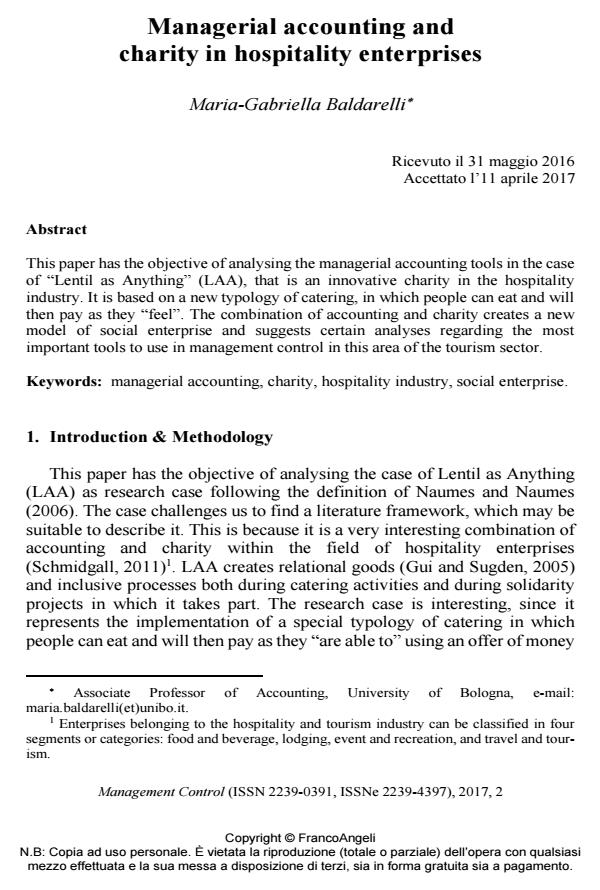Managerial accounting and charity in hospitality enterprises
Journal title MANAGEMENT CONTROL
Author/s Maria Gabriella Baldarelli
Publishing Year 2017 Issue 2017/2 Language English
Pages 17 P. 53-69 File size 674 KB
DOI 10.3280/MACO2017-002004
DOI is like a bar code for intellectual property: to have more infomation
click here
Below, you can see the article first page
If you want to buy this article in PDF format, you can do it, following the instructions to buy download credits

FrancoAngeli is member of Publishers International Linking Association, Inc (PILA), a not-for-profit association which run the CrossRef service enabling links to and from online scholarly content.
This paper has the objective of analysing the managerial accounting tools in the case of "Lentil as Anything" (LAA), that is an innovative charity in the hospitality industry. It is based on a new typology of catering, in which people can eat and will then pay as they "feel". The combination of accounting and charity creates a new model of social enterprise and suggests certain analyses regarding the most important tools to use in management control in this area of the tourism sector.
Keywords: Managerial accounting, charity, hospitality industry, social enterprise.
- Gray R., Owen D. and Adams C. (1996), Accounting and accountability. Changes and challenges in corporate social and environmental reporting, London, Prentice Hall Europe.
- Alford H.OP, Clark M.A., Cortright S.A., Naughton M.J. (2006), Rediscovering abundance. Interdisciplinary essays on wealth, income and their distribution in the catholic social tradition, Indiana, University of Notre Dame Press.
- Andreaus M. (1995), Le aziende non profit, Milano, Giuffré.
- Argiolas G. (2014), Il valore dei Valori, Roma, Città Nuova.
- Baldarelli M.G., Del Baldo M. and Ferrone C. (2015), The Relationships Between CSR, Good Governance and Accountability in the Economy of Communion (EoC) Enterprises, in Idowu S.O., Frederiksen C.S., Mermod A.Y. and Nielsen M.E.J. (Eds.) Corporate Social Responsibility and Governance: Practice and Theory, Collana, CSR, Sustainability, Ethics & Governance, N.Y., Springer, pp. 3-38. DOI: 10.1007/978-3-319-10909-1_1
- Bebbinghton J. (2007), Accounting for sustainable development, Oxford, CIMA.
- Capaldo P. (2016), Non Profit. Tra solidarietà e Impresa, Salerno, Hoepli.
- Cataldo V. (2015), Il controllo relazionale nelle destinazioni Turistiche: alcune evidenze empiriche, Management Control, 3, pp. 23-48. DOI: 10.3280/MACO2015-003004
- Catturi G. (Eds.) (2004), La determinazione del “valore creato”, Vol II., Padova, Cedam.
- Chapman C.S, Cooper D.J. and Miller P.B. (2009), Linking accounting, organizations and Institutions, in Christopher S. Chapman, David J. Cooper, Peter B. Miller (eds), Accounting, Organizations, & Institutions. Essays in Honour of Anthony Hopwood, Oxford, Oxford University Press, pp. 1-29.
- Coda V. (1988), L'orientamento strategico dell'impresa, Torino, UTET.
- Compagnoni F. and Alford H. (ed) (2008), Fondare la responsabilità sociale d'impresa : contributi dalle scienze umane e dal pensiero sociale cristiano, Roma, Città nuova.
- Ferraris Franceschi R.(1990), L’indagine metodologica in Economia aziendale, Milano, Giuffrè.
- Freeman E. (1984), Strategic Management. Stakeholders approach, Pitman, Boston.
- Gabrovec Mei O. (1984), Il valore aggiunto dell’Impresa, Trieste, Goliardica.
- Gabrovec Mei O. (1986), Metodologie quantitative di determinazione del valore aggiunto aziendale, Trieste, Goliardica.
- Gold L. (2004), The sharing Economy. Solidarity Networks Transforming globalization, Ashgate, UK.
- Gui B. and Sugden R. (eds.) (2005), Economics and social interactions. Accounting for interpersonal relations, Cambridge, Cambridge University Press.
- Lingane A. and Olsen S. (2004), Guidelines for Social Return on Investment, California Management Review, 3, pp. 116-135. DOI: 10.2307/41166224
- Marchi L. (2015), Editoriale. Nuove prospettive di ricerca sulle tematiche di Management Control, Management Control, 3, pp. 5-8. DOI: 10.3280/MACO2015-003001
- Matacena A. (2010), Corporate social responsibility and Accountabilty: Some Glosses, in Baldarelli M.G. (ed.), Civil Economy, Democracy, Transparency and Social and Environmental Accounting Research Role, Milano, McGraw-Hill.
- Matacena A. (2006), L’accountability nelle imprese lucrative e sociali. Verso una possibile convergenza?, in Arena P. (ed), The corporate social responsibility. Scientific development and implementation, Roma, Aracne, pp. 145-195.
- Millar R. and Hall K. (2012), Social Return on Investment and performance measurement, Public Management Review, 6, pp. 923-941. DOI: 10.1080/14719037.2012.698857
- Molteni M. (2009), Aziende a movente ideale, in Zamagni and S., Bruni, L.(ed.), Dizionario di Economia Civile, Roma, Città Nuova, pp. 65-75.
- Naumes W. and Naumes M.J. (2006), The Art and Craft of Case Writing. 2nd ed., London, ME Sharpe.
- Rusconi G. (2006), Stakeholder and documents of the direct accountability of companies, in Arena P. (ed), The corporate social responsibility. Scientific Development and implementation, Roma, Aracne, pp. 235-255.
- Rusconi G., Freeman R.E. and Dorigatti M. (eds) (2007), Teoria degli stakeholder, Collana Persona, imprese e società, Milano, Angeli.
- Sainaghi R., Phillips P. and Zavarrone E. (2017), Performance measurement in tourism firms: A content analytical meta-approach, Tourism Management, 59, pp. 36-56.
- Schmidgall R.S. (2011), Hospitality Industry Managerial Accounting, American Hotel and Lodging educational Institute, Lansing, Michigan, 7th ed.
- Visser W. (2012), The quest for sustainable Business, UK, Greenleaf Publishing.
- L'introduzione di un sistema di prezzi di trasferimento. Il caso dell'Azienda Ospedaliero-Universitaria Pisana Luca Del Bene, Antonello De Vito, Carlo Milli, Fabio Guarracino, in MANAGEMENT CONTROL 2/2018 pp.35
DOI: 10.3280/MACO2018-002003
Maria Gabriella Baldarelli, Managerial accounting and charity in hospitality enterprises in "MANAGEMENT CONTROL" 2/2017, pp 53-69, DOI: 10.3280/MACO2017-002004